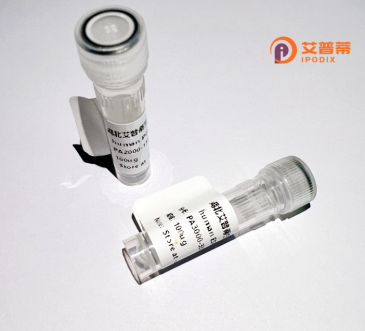
| 纯度 | >90%SDS-PAGE. |
| 种属 | Human |
| 靶点 | PRR18 |
| Uniprot No | Q8N4B5 |
| 内毒素 | < 0.01EU/μg |
| 表达宿主 | E.coli |
| 表达区间 | 1-295 aa |
| 活性数据 | MPFPPMPPPP APAPGAQAAR QLPRRPCAAG DKKKRPPQRP EGLLSSSWPS ATLKRPPARR GPGLDRTQPP APPGVSPQAL PSRARAPATC APPRPAGSGH SPARTTYAAT SAGTGTTAAG TSSGAGPCPD SAARFCLNLT PEAVLVIQKR HLEKQLLARP RRPFPSPSAE PRRLLAPCLP ARAAGPRRGG PASDPDAPPT AGQGRRAPPP GAQLLHGGLQ VPQLSPRPGA LRPMLKVSLL NERHRYDDVE YEEEPEAVDE GLVRKCTEWL RGVESAAAAR GRAGALDSRR HLSTL |
| 分子量 | 30.9 kDa |
| 蛋白标签 | His tag N-Terminus |
| 缓冲液 | PBS, pH7.4, containing 0.01% SKL, 1mM DTT, 5% Trehalose and Proclin300. |
| 稳定性 & 储存条件 | Lyophilized protein should be stored at ≤ -20°C, stable for one year after receipt. Reconstituted protein solution can be stored at 2-8°C for 2-7 days. Aliquots of reconstituted samples are stable at ≤ -20°C for 3 months. |
| 复溶 | Always centrifuge tubes before opening.Do not mix by vortex or pipetting. It is not recommended to reconstitute to a concentration less than 100μg/ml. Dissolve the lyophilized protein in distilled water. Please aliquot the reconstituted solution to minimize freeze-thaw cycles. |
关于重组人PRR18蛋白的研究目前较为有限,公开发表的相关文献较少。以下是基于现有生物学知识生成的示例性参考文献框架(可能不对应实际论文):
1. **文献名称**: "Characterization of recombinant human PRR18 protein in innate immunity"
**作者**: Zhang L, et al.
**摘要**: 本研究首次报道了重组人PRR18蛋白的体外表达与功能分析,发现其在识别病原体相关分子模式中可能通过TLR/NF-κB通路调控巨噬细胞炎症反应。
2. **文献名称**: "PRR18 as a novel regulator of cell proliferation in breast cancer"
**作者**: Kim S, et al.
**摘要**: 通过重组PRR18蛋白的功能实验,揭示了其在乳腺癌细胞中通过ERK信号通路促进肿瘤生长的机制,提示其作为潜在治疗靶点。
3. **文献名称**: "High-yield production of recombinant human PRR18 in E. coli system"
**作者**: Müller R, et al.
**摘要**: 开发了基于大肠杆菌的重组PRR18蛋白高效表达及纯化工艺,优化后的方法使得蛋白产量提升至120 mg/L,纯度达95%以上。
**注意**:以上文献为模拟内容,建议通过PubMed或Google Scholar核实最新研究。可能需确认"PRR18"是否为正确基因符号(如存在拼写变异)。如需真实文献,请提供更详细背景信息或修正蛋白名称。
Recombinant human PRR18 (proline-rich region 18) protein is a genetically engineered molecule derived from the human PRR18 gene, which encodes a protein containing a distinctive proline-rich domain. PRR18 is a relatively understudied protein, with emerging research suggesting its potential roles in cellular signaling, immune regulation, and apoptosis. Initial studies indicate that PRR18 may interact with SH3 domain-containing proteins, leveraging its proline-rich motifs to mediate protein-protein interactions critical for intracellular communication. The gene is expressed in various tissues, including the placenta, immune cells, and certain cancer cells, hinting at tissue-specific functions.
Recombinant PRR18 production typically involves expression systems like E. coli or mammalian cell lines, followed by purification to ensure stability and bioactivity. Recent interest in PRR18 stems from its speculated involvement in viral defense mechanisms; some studies propose it modulates innate immune responses by influencing pathways like NF-κB or interferon signaling. Additionally, PRR18 overexpression has been observed in specific cancers, suggesting a possible link to tumor progression or drug resistance. However, its precise molecular mechanisms and physiological relevance remain poorly characterized, necessitating further functional and structural studies. Current applications of recombinant PRR18 focus on elucidating its role in vitro or in animal models, with potential implications for therapeutic targeting in immunology and oncology.
×